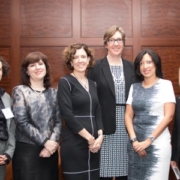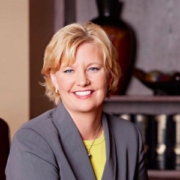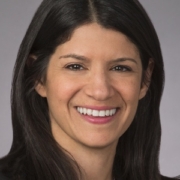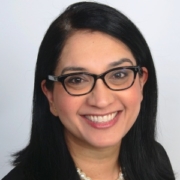Learning from Others: The Toigo Foundation’s Annual Groundbreakers Summit
In December, the Toigo Foundation, a partner of theglasshammer.com held its fourth annual Groundbreakers Summit for female leaders. This year’s theme was action-based and explored the key resources, tools and relationships needed to help women advance in their careers.
Founded in 1989, the Toigo Foundation established an educational fellowship program (The Financial Services Fellowship) focused on careers in financial services for minorities. Now in its 25th year, the Toigo Foundation has provided MBA fellowships and internships for women and minority professionals, and has since added lifelong mentoring, career development programs, and networking. The group now counts over 1,000 alums in key leadership roles across finance, government and academia.
The day’s presentations were equal parts analysis, inspiration and brainstorming. The morning plenary session called Journey to the Top: What’s in Your Toolkit? This session explored the challenge of rising to the top from both internal and external perspectives. Adena Friedman, President of Global Corporate and Information Technology at NASDAQ, encouraged the attendees to consider the possibility that they can succeed “if they think and act like a woman.” She acknowledged that women face all sorts of external hurdles to success and gender parity – structural, cultural, systemic, but that in her opinion, the keys to success are one’s internal perceptions. Freidman advised,
“Just as someone can’t make you a leader without your consent, they also can’t make you inferior without your consent.”
Friedman then advocated actions over words, “Saying yes to a challenge makes you a risk taker. You don’t have to say, ‘I am a risk taker.’”
Erika Hayes James was named the John H. Harland Dean of Goizueta Business School at Emory University in May 2014 and opened by saying that she was “unprepared for the attention” she received as the first minority female to lead a major business school. Dr. James’s presentation discussed the challenges to one’s confidence of being “different from the majority” and went on to comment on the effects of being in the power minority,
“As a woman in business we are always in the spotlight, under scrutiny, simply because we are different from the majority, and this often causes women to cast doubt upon ourselves.”
According to Dr. James, women generally rely on three coping mechanisms to deal with their confidence issues, which she stated as ‘overachievement, assimilation or hiding in support roles’.
Unfortunately each of these coping mechanisms is limiting at best. A philosophy of overachievement often sets a person up for failure; cultural assimilation doesn’t let a person use their own unique strengths and insights and hiding in support roles is often just that – hiding.
Head of Global Research for Bank of America Merrill Lynch, Candace Browning, recounted her personal story of success despite not fitting the finance mold but stated that “I was okay as an outsider.”
Born in the Virgin Islands and a History and Russian Language major she entered a joint program at Columbia to study business and International Affairs, Browning “fell in love with case method” and eventually graduated with an emphasis in marketing. She joined PanAm and eventually leveraged her knowledge of the airline industry into equity research. Looking back she commented, “There wasn’t a lot of planning but I was willing to take risks.” Along the way she was constantly learning and asking questions, she advises women to “tell the story to get the promotion.”
Dr. Anne-Marie Slaughter, closed the morning plenary sessions with her thoughts on balancing competition and care. Dr. Slaughter is President and CEO of the New America Foundation and author of “Why Women Still Can’t Have it All”. Dr. Slaughter stated in her polarizing interview in the Atlantic in 2012 that women can ‘have it all’ and explained that women can even ‘have it all at the same time’ but takes the stance that there are structural and societal barriers that need to change to allow women to fully enjoy success at work and home.
Dr. Slaughter contended at the event that women are doing themselves a disservice by holding onto self-defeating beliefs such as, “It’s possible if you are just committed enough” and “It’s possible if you marry the right person.” She advocates for women to look instead at finding solutions to obstacles such as default rules about when and where and how work has to be done.
The final two sessions of the day were inspirational and examined how women’s decisions can change the world – and how much need there is for change. Nevada State Assemblywoman, Lucy Flores, recounted her personal tale of growing up poor, early run-ins with the justice system, becoming a politician and, most powerfully, her failed campaign to be Lieutenant Governor of Nevada. “Always go with your gut” is a cornerstone of Flores’s philosophy. Her strength was tested when she testified regarding a sexual education bill in Nevada. The bill promoted abstinence and Flores, relying on her gut, revealed that she had an abortion as a teen and that at the time it was her best option. “The backlash was horrible,” she recalled, “and I thought that following my gut was the worst mistake I could have made. However, eventually more and more people came forward to support me and I am happy to say that my disclosure helped move the needle nationally in the discussion of teen sexuality.” Flores also encouraged women to choose work that “makes them happy, even if it is hard. If fear is holding you back you are missing opportunities. Failure is difficult, but it is harder to live with regret.”
The final presentation was given by Terri McCullough, Director, No Ceilings Project at the Clinton Foundation. The project looks at ways to better integrate women into all aspects of political, social and economic life across the globe and the costs of leaving women out of the equation. McCullough encouraged attendees to “think more broadly about where opportunity and support may lie for women’s progress.”
After McCullough’s presentation, attendees broke into small discussion groups to brainstorm and present possible solutions to the gender parity situation. At the conclusion, Jeanne Sullivan, a technology venture capitalist with StarVest partners, addressed the crowd saying that she was particularly optimistic about the outlook for women in business and financial services. “Men who are marrying now have come up through the ranks and have seen how things work against women. They want their daughters to succeed and they will do what they can to change the culture to help them succeed.”
By Beth Senko











